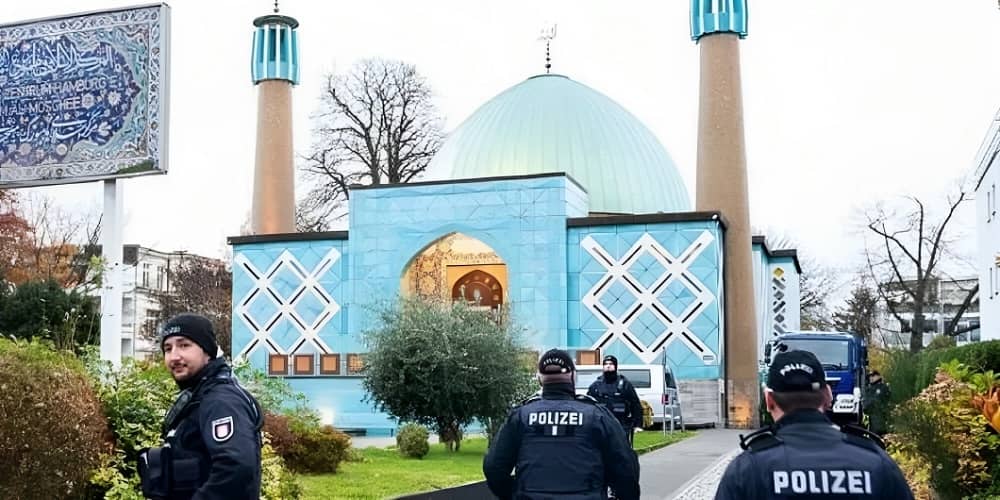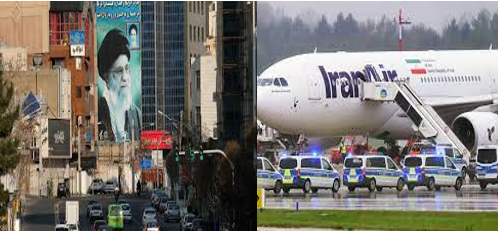

Over 500 officers participated in the early morning raids, signifying a major escalation in efforts to counteract Tehran’s espionage activities within Germany.
Interior Minister Nancy Faeser revealed that the Islamic Center has long been under surveillance by the Bundesamt für Verfassungsschutz (Office for the Protection of the Constitution), Germany’s intelligence service, which classified it as an Islamist organization. The operation extended beyond Hamburg to Lower Saxony, Hessen, Baden-Württemberg, Bavaria, Berlin, and North Rhine-Westphalia, targeting five other groups believed to be connected to the Iranian regime.
The German Ministry of the Interior stated that the Islamic Center of Hamburg is suspected of acting against constitutional order and promoting cultural exchange, potentially violating the Basic Law and the Law on Associations. Additionally, the center is under investigation for supporting Hezbollah, a group already outlawed in Germany for its terrorist activities.
THREAD
For more than four decades, the clerical regime in #Iran has consistently blackmailed other nations and considered #extremism as "leverage". 1/9https://t.co/ieaaOkZb6y pic.twitter.com/W9u5BJHXqs— NCRI-FAC (@iran_policy) September 6, 2022
This crackdown is not without precedent. The Islamic Center, alongside other Iranian intelligence and espionage entities, has been monitored for decades. However, diplomatic considerations have previously hindered decisive action. The Office for the Protection of the Constitution’s reports frequently mention the National Council of Resistance of Iran (NCRI) and the People’s Mojahedin of Iran (PMOI/MEK) as primary targets of the Iranian regime’s espionage efforts.
A significant breakthrough came in 2018 with the arrest of Asadollah Assadi, a high-ranking Iranian diplomat in Vienna, on German soil. Investigations following his arrest revealed extensive espionage activities across Europe.

Most notably, the Islamic Center of Hamburg was mentioned in these documents, leading to suspicions of its role in exporting the Islamic Revolution to Germany. Western security services have long had intelligence on Iran’s espionage networks but have been slow to respond, possibly due to political reasons or underestimating the threat level.
The recent operation indicates a shift in this stance, acknowledging the Iranian regime’s potential to jeopardize national security and stability in Western countries. The Iranian dissident group GhiyamtaSarnegouni has played a crucial role in exposing these networks, highlighting Tehran’s continuous recruitment and training of elements for terrorist activities abroad.
Assadollah Assadi’s case is just the tip of an iceberg. Although he's been arrested & his verdict will be announced on Feb4, the network he led is largely untouched, & certainly, the regime has replaced Assadi with someone else. #EUTime4FirmIranPolicy #ShutDownIranTerrorEmbassies pic.twitter.com/o2Gllb9A61
— Masumeh Bolurchi (@MasumehBolurchi) February 1, 2021
With the recent developments in Gaza, the urgency to address Tehran’s influence in terrorism has become more apparent. This operation, akin to the impactful “Ahmad Chalabi” intelligence endeavor, marks a significant step in combating Tehran’s far-reaching and dangerous espionage activities.

MEK Iran (follow us on Twitter and Facebook), Maryam Rajavi’s on her site, Twitter & Facebook, NCRI (Twitter & Facebook), and People’s Mojahedin Organization of Iran – MEK IRAN – YouTu







